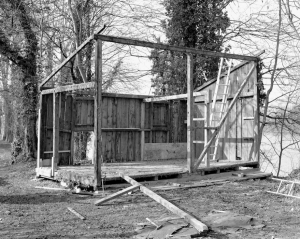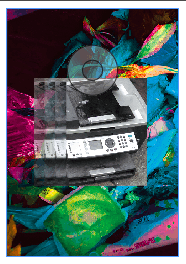This week i focused on content, including interviews for the magazine. I wasn’t initially going to include interviews but felt it was important to build context in the magazine as well as have engaging information and facts from industry professionals about the topics in the magazine. I have never interviewed anyone before i was a little apprehensive however i found it really interesting to listen to these ladies talk about sustainability and waste.
Week 12 :: food photography and interviews
My initial thoughts on my publications was to be more of a image book that was a almost like a diary of my waste experiences and findings however, whilst looking at my aesthetic and target audience i felt like making it into more of a magazine that might see more issues would be appropriate. I carried on with shooting moving further into waste by looking a food waste. I created a series of images inspired by Maisie Cousins that was made up of my own food waste.
I also decided to feature a couple of interviews in my publications so contacted several appropriate industry professional however found that only two came back; Orsola De Castro ( Fashion Revolution) and Cat Fletcher(waste prevention)
Week 11 :: Test Shoots
I followed on into this week doing more shoots for the magazine alongside annotating my sketchbook. I wanted to work on the idea of trends and waste, so i looked at recreating trends out of household items or recycling. These images are from the shoot which i think came out nice however don’t the aesthetic of my magazine. This shoot will be reshot.
Week 10:: Shoots
This week i focused on shooting my first features for my magazine. I booked out the whole day at the Day light studio in Brighton to get different shoots done as they have a nice natural aesthetic. This time included fashion shoots and still life imagery. Th fashion images were styled with second hand clothes which i feel worked well. The still life imagery didn’t come out how i planned which was disappointing and i also found i only liked a couple of the images from the fashion shoot so decided to shoot on location in the Brighton Flea Market allowing me to have a mixture of images for my publication.
Week 9 :: Publication Competitors, Shoot Moodboards, Visual Identity and Film photos
More or Less is a magazine that highlights the areas of consumption through engaging fashion and lifestyle imagery using photography and still life as well as creative concepts expressed through styling and stylized fonts. I also looked at Ordinary Magazine who are a quarterly photography and fine art publication that works with various artists to create unique content that is centre around one object that accompanies the magazine. Another competitor who i though matched my publication well is Hot Hot Hot! Magazine who are a new publication that uses fashion photographing to make contemporary and innovative solutions through visual stigmatism that explore the new future.
With the analysis of different topic areas within sustainability that capture waste in different ways, I began to build some initial ideas for editorial shoots and spread contents. I have looked at different style in ways that I can represent this relevant topic in a way that will suit my main demographic. Whilst looking at making my content quite vibrant and playful, i wanted to create a very minimal and typographic publication so created a moodboard that incorporated very sporadic layouts and large text that build impact.
Over the course of the last few months i wanted to include images of discarded items from the streets of Brighton so have been taking my film camera around with me and capturing things I find. This has been a long process as i found there was a real repetition of items that people had left.
Week 8 :: Simon Starling, Cornilea Parker and Steve Mcpherson
This week I want to carry on my research by looking at the deconstruction of objects and how they can be manipulated into carrying a different meaning.

Cold Dark Matter: An Exploded View 1991 Cornelia Parker born 1956 Presented by the Patrons of New Art (Special Purchase Fund) through the Tate Gallery Foundation 1995 http://www.tate.org.uk/art/work/T06949
Cornelia Parker the artist behind ‘Cold Dark Matter: An Exploded View’ who created an immersive installation in the Tate using an exploded shed destroyed by the British army at her request. With previous work around the subject of controlled explosions, Parker wanted to create a more dramatic piece that worked to explore the imagery that society today is being bombarded with in terms of war and destruction. The shed was created by a separate company which was then filled with random collected objects collected over a three month period that were other donated by relatives or belonged to Parker herself.
Simon Starling, turner prize winner created an installation titled ‘Shed boat shed’. Shed boat shed was a symbolism of architectural mobility, using a found, abandoned shed which was deconstructed and made into temporary boat in which it was then transported 8km down river to Basel whilst carrying the excess materials of the boat. The boat was then dismantled again and remade into the original shed within the Museum für Gegenwartskunst to create a harrowing and structurally engaging art form.
Steve McPherson is a British artist who works primarily with found objects to create concepts and express societal concerns that are relevant in recent times. He has used various materials, including vast amounts of small plastic pieces as a direct material for various art pieces. Although colour blind, McPherson is tending to colour co-ordinate these materials to make complex patterns and visual textures. His series lost property is of forgotten items that were handed in to the south eastern railway from 2013. This series contains a variety of items from keys to cool bricks as well as more sentimental items like children toys and footballs. I chose to look at McPhersons work as like the other artists I have looks at that focused on objects.
Week 7 :: Eian Kantor, The Object, Eternally Yours & Micheal Landy
This week I wanted to continue researching into other artists that were looking at objects in a conceptual way as well as looking at publications and articles that were exploring the relationship between objects and mass consumption.


Eian Kantor is an New York photographer whose work on conveying his subjects in their most natural form portrayed through several of his collection titled ‘Found sculptures’ and ‘(don’t)look down: 512 discarded cigarette boxes’. Similar to Guy Batey, this collection of images is a exploration of the object not in their natural environment. Although Batey and Kantors work are similar, Kantor has worked on using 2 mediums, phone and camera, which is reflected in the quality of the images and vibrancy of them.


Micheal Landy is a British Artist whose work titled ‘Break Down’ 2001 and ‘Art Bin’ project in 2010 I found relevant as they both look at the idea of necessity and why we need our belongings. ‘Art Bin’ was a project created by Landy to question the role of value and the emotional attachment to objects. Landys ‘Break Down’ installation saw him collect everything he owned; 7,227 items in an empty shop in oxford street where you placed everything onto conveyor belts and destroyed every piece. By the end of the exhibition, Landy owned nothing but what he was wearing and saw the depletion of artist work he had accumulated as well as his own as a symbolic gesture to identifying the western cultures resistance in keeping what they own and contributing the mass consumption.
Eternally Yours
Eternally Yours explores the ideas of how consumers forms relationships with objects the ways in which these relationship can become destructive or tainted by modern society and the fast paced movement of corporate industries.
The Object
Similar to Eternally yours, The object looks at different areas of how an object contextualise itself into materialistic society. Objects are used by the consumer to signify the direction and individual is taking and identifying our own needs however, The Object further explain how objects have an initial identifier, the meaning of their purpose.
Week 6 :: Initial research into Objects and Belongings
Snoopers Paradise
Looking into waste, i wanted to explore further what waste is which meant looking at its origin. This led me to looking at Objects or belongings and the psychological connection we have with our items and the reasoning for throwing them away. I went into Snoopers Paradise as it is known for its vast selection of items from vintage clothes to animals in jars. I have been in there a few times and have become aware of the large number of old family photos that are up for sale, which i feel really embodies the nature in which throw away even our most sentimental items. The idea that a families holiday photos or school portraits are up for sale for someone else to buy and repurpose and that we can even put a price on someone else belongings.
This led to the further exploration of this idea, and looking at artists below:
Paula Morales
This work is a collaboration between Paula Morales, Gutta Galli, and Anita Giasante which looks at found objects and their continuous projection of human life even after death. I found this work interesting as it reflecting a persons personality through an inanimate item which allows for strangers to come and interpret this from their perspective.
Guy Batey
This series of images by Guy Batey titled ‘ The Melancholy of Objects’ is a display of object Batey came across throughout living in east London. These images are of objects that have been discarded or forgotten about and Batey describes how ‘Some of these objects stop me in my tracks with the power of their presence. They seem to want to talk to me, to tell me their stories. These photographs show what I feel they have to say.’
This concept was interesting to me as it conveyed the idea of how a object that has come to the end of its use, looking broken and destroyed, is able to explore the entirety of its lifecycle, portrayed in its natural form which identifies how although its initial ability for purpose has ended, its still ives through it current state.
The format in which Batey has taken his images is similar to photographers mentioned in previous posts, which
Photography Experimentation :: Digital & Collage
I experimented with digital photography, using my phone to create some low quality high focused images, which i experimented with layout and distortion using photoshop. These images follow on from waste in food and objects, looking at the ease in discarding objects with emotional detachment.
Using magazines and other images, i created collages that reflected waste and sustainability where i then edited them further using photoshop to create a more dynamic image.
GIF Experimentation
Using photoshop, i followed on from the distortion of the images previously, by changing the format of these images using colour and movement to make dynamic GIFS that reflect how waste is manipulated from its original form to being repurposed.










































